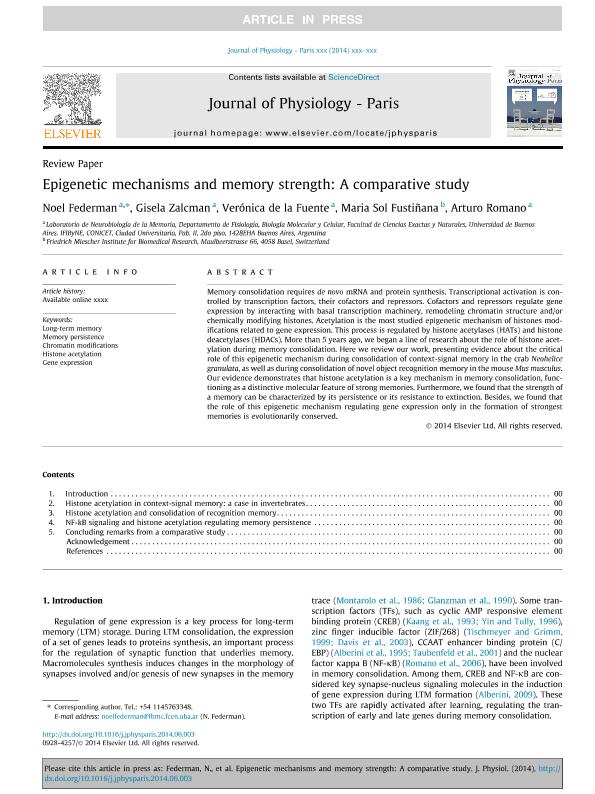Artículo
Epigenetic mechanisms and memory strength: A comparative study
Federman, Maria Noel ; Zalcman, Gisela Patricia
; Zalcman, Gisela Patricia ; de la Fuente, Verónica
; de la Fuente, Verónica ; Fustiñana, María Sol
; Fustiñana, María Sol ; Romano, Arturo Gabriel
; Romano, Arturo Gabriel
 ; Zalcman, Gisela Patricia
; Zalcman, Gisela Patricia ; de la Fuente, Verónica
; de la Fuente, Verónica ; Fustiñana, María Sol
; Fustiñana, María Sol ; Romano, Arturo Gabriel
; Romano, Arturo Gabriel
Fecha de publicación:
06/2014
Editorial:
Elsevier
Revista:
Journal of Physiology
ISSN:
0928-4257
Idioma:
Inglés
Tipo de recurso:
Artículo publicado
Clasificación temática:
Resumen
Memory consolidation requires de novo mRNA and protein synthesis. Transcriptional activation is controlled by transcription factors, their cofactors and repressors. Cofactors and repressors regulate gene expression by interacting with basal transcription machinery, remodeling chromatin structure and/or chemically modifying histones. Acetylation is the most studied epigenetic mechanism of histones modifications related to gene expression. This process is regulated by histone acetylases (HATs) and histone deacetylases (HDACs). More than 5 years ago, we began a line of research about the role of histone acetylation during memory consolidation. Here we review our work, presenting evidence about the critical role of this epigenetic mechanism during consolidation of context-signal memory in the crab Neohelice granulata, as well as during consolidation of novel object recognition memory in the mouse Mus musculus. Our evidence demonstrates that histone acetylation is a key mechanism in memory consolidation, functioning as a distinctive molecular feature of strong memories. Furthermore, we found that the strength of a memory can be characterized by its persistence or its resistance to extinction. Besides, we found that the role of this epigenetic mechanism regulating gene expression only in the formation of strongest memories is evolutionarily conserved.
Palabras clave:
Epigenetic
,
Mechanisms
,
Memory-Strength
,
Comparative
Archivos asociados
Licencia
Identificadores
Colecciones
Articulos(IFIBYNE)
Articulos de INST.DE FISIOL., BIOL.MOLECULAR Y NEUROCIENCIAS
Articulos de INST.DE FISIOL., BIOL.MOLECULAR Y NEUROCIENCIAS
Citación
Romano, Arturo Gabriel; Fustiñana, María Sol; de la Fuente, Verónica; Zalcman, Gisela Patricia; Federman, Maria Noel; Epigenetic mechanisms and memory strength: A comparative study; Elsevier; Journal of Physiology; 108; 4-6; 6-2014; 278-285
Compartir
Altmétricas



